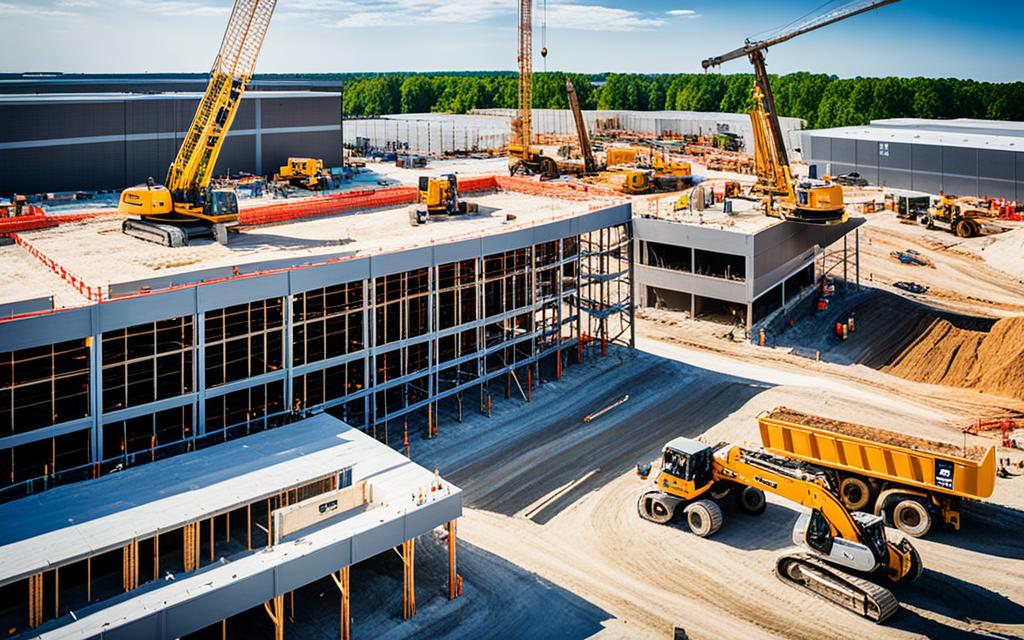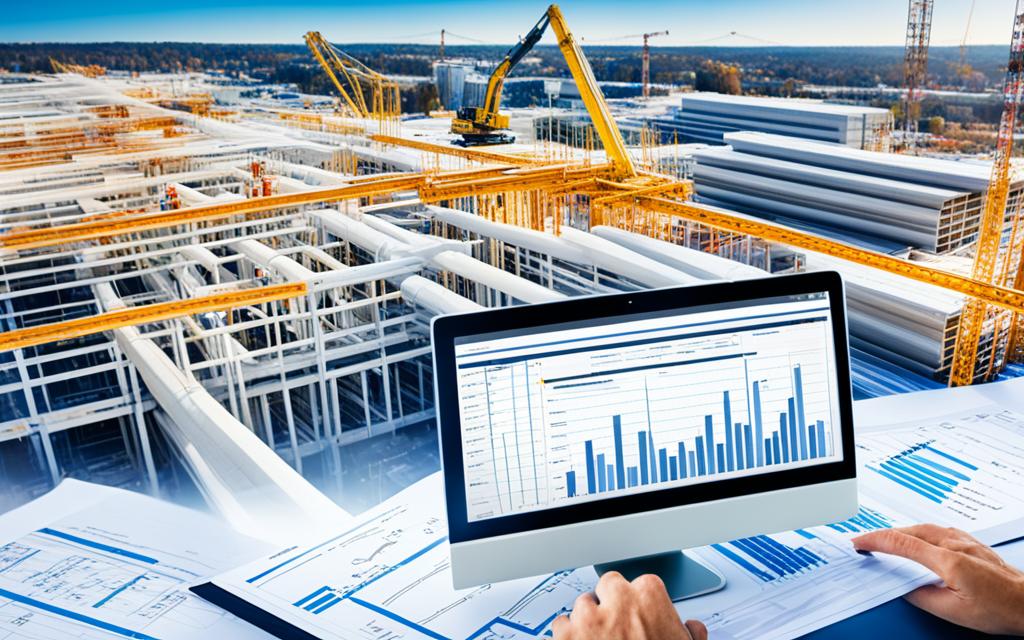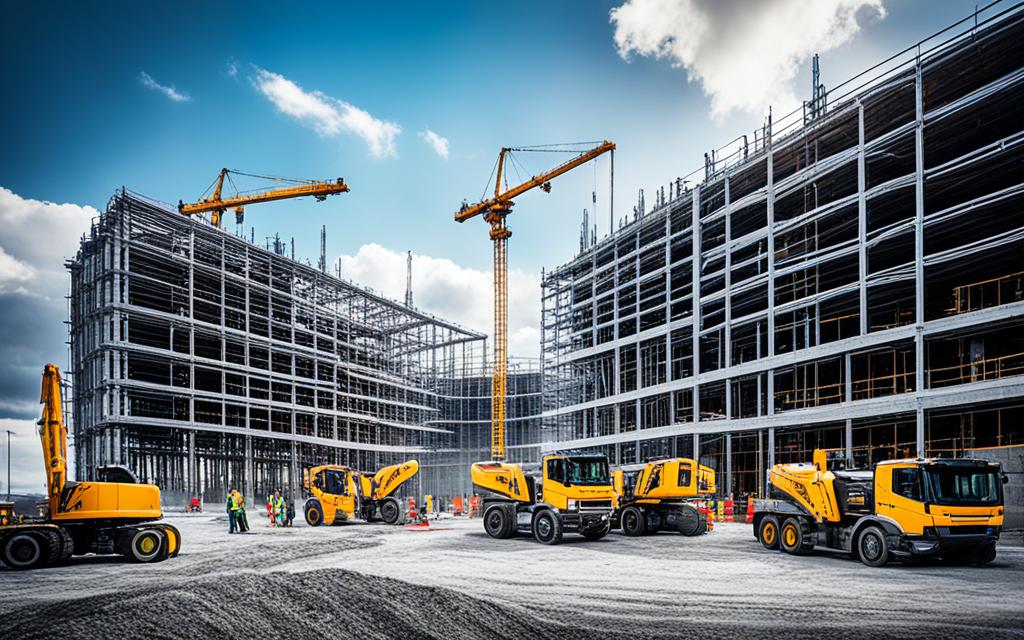Imagine being on a construction site at dawn. You can smell freshly cut timber and hear machines in the background. It’s during these moments, with blueprints and hard hats around, that the importance of our work really sinks in. Every beam, nail, and worker is key to making dreams real. In this tough scene, having the best tools is vital. This is why construction ERP systems are game-changers. They revolutionize project management and make our work smoother. As 2024 approaches, we’re on the edge of a new chapter in construction. It’s powered by the latest ERP software, made just for our industry’s needs.
Key Takeaways
- 2024 marks significant advancements in construction ERP systems.
- Forbes Advisor highlights innovative features in leading software.
- Key considerations include real-time reporting, integration capabilities, and automation tools.
- Top ERP solutions are evaluated based on various criteria, including market share and expert reviews.
- Understanding the best ERP software for construction can transform project management and operations.
Introduction to Construction ERP Software
In the construction field, managing projects, money, and resources needs special software. Construction industry ERP systems help with this. They give tools for managing money, workers, projects, and costs.
Unlike general planning systems, construction industry ERPs are made for construction needs. They handle things like scheduling, dealing with vendors, and following rules. This ensures everything works smoothly with building management software.
Choosing a construction industry ERP helps organize complex tasks. It brings together project leaders, accountants, and workers. This makes sure projects finish on time, stay on budget, and use resources well.
Also, companies providing materials or services to construction firms use these ERPs. It helps everyone work together better. A construction industry ERP boosts efficiency. It helps with record-keeping and analyzing data for better decisions.
Here’s a comparison table showing benefits of using building management software with a construction-focused ERP.
| Functionality | Benefits |
|---|---|
| Project Scheduling | Ensures timely project deliveries by managing timelines |
| Cost Control | Helps in maintaining budget limits and tracking expenses |
| Vendor Management | Facilitates better coordination with suppliers and subcontract)ors |
| Accounting & Payroll | Streamlines financial operations and payroll processes |
| Compliance Monitoring | Ensures adherence to legal and regulatory standards |
Knowing the perks of a specific ERP in construction changes things. With the right tech, companies can work better, spend less, and manage projects well.
Key Features to Look for in Construction ERP Systems
In today’s fast world, the right ERP system is a must for managing construction projects well. We need to know what features are key in a good construction ERP system.
Real-Time Reporting and Analytics
One important feature is real-time data analytics. It helps us make smart choices fast. This is by giving us the latest info on our projects.
Accounting and Financial Management
Dealing with construction money matters is tricky. So, we need strong accounting tools. These tools match the special needs of construction accounting. They help keep our money matters clear and correct.
Job Costing and Budgeting
Job costing and budgeting is also key. It helps us keep an eye on money in all projects. This means we don’t spend too much and plan our money needs well.
Integration Capabilities
Lastly, being able to integrate well is crucial. It means different parts of the ERP system work together smoothly. This cuts down on mistakes and double work in construction project management.
By looking at these main features, we can pick an ERP system that makes our work easier and more efficient.
Top Construction ERP Systems for Small Businesses in the US
Finding the right construction ERP for small business US is key. These systems must manage job site operations well. They should track materials and plan the workforce accurately. A simple-to-use interface and affordability are also crucial for managing small to medium projects.
Here’s a list of top ERP picks for small construction businesses in the US:
| ERP System | Key Features | Benefits |
|---|---|---|
| Procore |
|
|
| Buildertrend |
|
|
| CoConstruct |
|
|

Each ERP system offers unique benefits. However, they all help small businesses with job site operations and material tracking. This makes sure projects go smoothly from beginning to end. They are vital tools in the construction world.
Evaluating ERP Systems Based on Unique Features
When assessing ERP systems, look at what makes each one special. Automation in construction ERP helps operations run smoothly. Effective supply chain integration is also key. We’ll look at what makes some ERP systems stand out.
Automation Capabilities
Automation in construction ERP increases efficiency by cutting down manual work. It covers scheduling to reporting, making processes accurate and fast. Adding IoT and AI changes how projects are done.
Supply Chain Management
A strong supply chain is crucial for construction ERP. It ensures good communication with suppliers and transportation. With strong supply chain options, managing inventory and timely deliveries keep projects on track.
Construction-Specific Modules
Construction-specific modules offer tools for project and workforce management, and compliance. They meet construction’s unique needs. This makes these ERP features very important for construction companies.
| ERP System | Unique Features | Benefits |
|---|---|---|
| Procore | Real-time dashboards, Mobile Project Management | Improved field-to-office communication, Instant updates |
| Viewpoint | HR Management, Financial Planning | Comprehensive employee tracking, Enhanced budget management |
| SAP S/4 HANA | Advanced Analytics, Supply Chain Tracking | Data-driven insights, Optimized logistics |
Comparing Leading Construction ERP Software Providers
Choosing the right ERP system is key for construction projects. We examine Viewpoint ERP, Unanet ERP, and SAP S/4 HANA. Each of these has features for construction needs.
We want to make comparing easier. So, we give a detailed look at what each system offers.
Viewpoint
Viewpoint ERP is known for its strong features. It works well with other systems and gives real-time data. Also, it has great tools for working together on projects.
Many choose Viewpoint for its focus on construction needs. It helps with job costing and project management, covering many areas. This ensures projects are handled well from start to end.
Unanet
Unanet ERP is for architecture and engineering firms. It has features for compliance and smooth project management. It’s a good fit for smaller to mid-sized businesses.
Unanet is known for its resource management and real-time reports. It also has strong financial tools. These features make it a strong choice among ERP providers in construction.
SAP S/4 HANA
SAP S/4 HANA is great for large construction companies. It works well with other SAP solutions. This ERP system is scalable and comprehensive.
It’s known for managing finances, supply chains, and projects. SAP S/4 HANA can manage complex projects and large amounts of data. It’s important to consider when looking at ERP options.
| ERP Provider | Key Features | Best For |
|---|---|---|
| Viewpoint ERP | Real-time data, project collaboration, job costing | Comprehensive construction management |
| Unanet ERP | Compliance, resource management, real-time reporting | Small to mid-sized architectural and engineering firms |
| SAP S/4 HANA | Financial management, supply chain, project management | Large-scale construction enterprises |
The Importance of Integration in Construction ERP Systems
Integration is more than a buzzword in modern construction management. It’s key for operational efficiency. With construction management integration, departments like project managers and financial controllers work together smoothly. This teamwork is critical for seamless workflows and consistent data handling.

Integrated construction software makes things easier by having a central hub. This hub handles tasks like scheduling and budgeting all in one place. It boosts communication, efficiency, and cuts back on doing the same work twice. In construction management integration, we bring different processes together into one system. This helps close the gaps between planning, executing, and reporting.
A big win with integrated construction software solutions is better project timing and using resources wisely. With everything in one spot, teams can quickly find what they need. This quick access helps in making smart choices faster.
Here’s a table that shows how integration helps in construction ERP systems:
| Feature | Benefit |
|---|---|
| Centralized Data Management | Enhanced accuracy and instant access to project info |
| Seamless Communication | Better teamwork across departments |
| Accuracy in Financial Control | Fewer mistakes and smoother financial handling |
| Resource Optimization | Smart use of materials and labor to cut waste |
By adding a construction ERP system with top-notch construction management integration, we boost our methods. This sets new standards for excellence in construction. This strategy leads to smooth operations, ensuring projects finish well and stakeholders are happy.
Top ERP Solutions for Different Construction Sectors
Today, construction businesses face different needs. It’s important to find ERP solutions just right for them. We’ll look at options for commercial, residential, and subcontractor management. The right ERP software makes managing projects, money, and resources easier for these sectors.
Commercial Construction
Commercial construction involves big projects that need a lot of control and accuracy. The best commercial construction ERP systems have tools for managing projects, keeping costs in check, and following rules. With the right ERP, companies can make their operations smoother. This helps finish projects on time and stay within budget.
Residential Construction
Residential builders need tools designed for their projects. Their software focuses on planning, working with clients, and estimating costs well. This helps to keep up quality and make customers happy. At the same time, it manages many projects easily.
Subcontractor Management
Handling subcontractors is key in construction. A good subcontractor ERP system has features for managing contracts, payments, and how well work is done. This makes sure subcontractors finish their jobs well and on time. It also helps everyone work better together and lowers risks.
| ERP Solution | Best For | Key Features |
|---|---|---|
| Procore | Commercial Construction | Project Management, Financials, Compliance |
| Buildertrend | Residential Construction | Design Management, Client Relations, Cost Estimation |
| eSUB | Subcontractor Management | Contract Management, Payment Tracking, Performance Monitoring |
With the right ERP solutions, construction companies can get better at what they do. They can meet unique project needs more efficiently. This leads to better results.
Real-World Reviews and Expert Opinions on Construction ERP Systems
Choosing the right ERP system matters a lot. Insights from real-world reviews and expert opinions help a lot. They let us know which software stands out.
Now, let’s explore some expert evaluations from leading voices in the industry:
| ERP System | Key Highlights | User Feedback |
|---|---|---|
| Procore | Integration capabilities, user-friendly interface | “Procore has streamlined our project management process. Integration with other tools is seamless.” |
| Viewpoint | Comprehensive reporting and analysis, robust support | “Viewpoint’s real-time reporting has transformed how we monitor project progress.” |
| Unanet | Advanced job costing and budgeting, flexibility | “Unanet’s budgeting tools are exceptional, allowing for accurate financial forecasting.” |
User feedback highlights how helpful these systems are. Procore gets kudos for its integration and ease of use. Viewpoint is praised for its great reporting and support.
“Procore has truly simplified our workflows with its user-friendly interface and seamless integrations. Its real-time capabilities keep everyone on the same page, which is invaluable for managing large-scale construction projects.”
Unanet is also a top pick for its budgeting and job costing tools. By comparing user feedback with expert views, we learn a lot. This helps us make smart choices when picking a system.
Conclusion
Exploring the top construction ERP software for 2024 shows us something important. The choice of a Construction ERP system must fit what your company needs. We looked at features like real-time reporting and financial management.
These elements help make construction work better. When choosing the right construction ERP, think about what your business needs. It’s key to match those needs with the ERP’s features.
We talked about systems like Viewpoint, Unanet, and SAP S/4 HANA. These give you a clear idea of what’s available.
To wrap things up, construction ERP systems help businesses hit their goals. They offer control and precision. With the right software, your company can do great in 2024 and after.
There are many tailored solutions out there. It makes it easier for companies to find what works for them. Making a smart choice lets your construction firm stand out.

